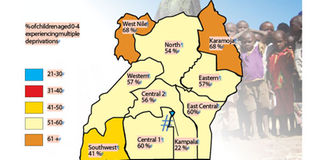3.5m children living in abject poverty - report

What you need to know:
According to the new survey, the rate of suffering by children below five is highest in West Nile and Karamoja closely followed by those in the central. Children in parts of south-west are said to enjoy the best living conditions in the country.
Kampala
About four million children under the age of five in Uganda live in poverty and are deprived of basic child rights, according to a new report.
The report, Child Poverty and Deprivation, the figure [3.7 million] of children living in poverty represents 57 per cent of the children population in Uganda.
The findings indicate that the rate of deprivation is high West Nile and Karamoja regions where, 68 per cent wallow in poverty followed by the central region at 60 per cent. Western Uganda which constitutes districts such as Bundibudyo, Kyenjojo and Kabalore posted 57 per cent similar to that of eastern Uganda [57 per cent].
The middle northern Uganda has a 54 per cent rate and the central which was divided into two sub-regions – central 1 and central 2, which posted 60 per cent and 56 per cent respectively.
On the other hand children in the south western region which includes Kabale, Mbarara and Kisoro, enjoy better livelihoods posting 41 per cent while Kampala posted the lowest at 22 per cent.
Causes
The report cites limited access to health care, nutrition, education, sanitation, shelter, among others, as the main causes of deprivation. “The issue is serious, 24 per cent of these children that are under five live in extreme poverty,” noted Dr Sarah Ssewanyana, the executive director Economic Policy Research Centre (EPRC), the firm behind the research. She added.
“The National Development Plan should strive to eliminate the disparities across Uganda. Issues pertaining to children need to be accorded more attention.” The report comes at the beginning of the child-week in which children’s livelihood is under the spotlight.
Earlier studies conducted by Unesco and Unicef in 2005 indicated that 7.7 million Ugandans were living below the poverty line, with an estimated 2.1 million children living in abject poverty.
Last week, President Museveni during his State-of-the Nation address, noted that the livelihood of most Ugandans had improved. Members of Parliament blamed government for the current state of children affairs in the country, insisting it has not done enough to tackle the problem.
“When you talk about feeding children, has the Ministry of Education provided for their nutritional needs? No. Visit schools and see,” said Mr Joseph Ssewungu (DP Kalungu West)
Apac woman MP, Ajok Lucy, said: “There are pockets in the north where statistics are even worse than those given in the report. There is something fundamentally wrong with this country’s prioritisation process.”
Responding to the report, Ms Mary Karooro Okurut, the Minister of Gender, said the report had some key issues that need to be addressed. “The results show that over half of our children (55per cent) live in multi-dimensional poverty and are deprived of at least two crucial areas of their rights.”
She said several government initiatives to remedy the situation have been brought before Parliament and Bills that are child-centred [Child Act, Immunisation Bill and Food and nutrition Bill] have been tabled.
The National Planning Authority boss, Dr Muvara Joseph, warned that the current trend is detrimental to the nation’s development goals as set out in Vision 2040.
“This country is not likely to achieve a dividend from high population growth if we do not address the issue of child poverty,” he said. “How do we expect to achieve those goals if most of our population is unproductive?” he wondered.
About EPRC
EPRC fosters sustainable growth and development by advancing the role of research in policy processes. The centre does this through provision of high quality applied research, practical policy analysis and advice, and policy focused dissemination and discourse.




